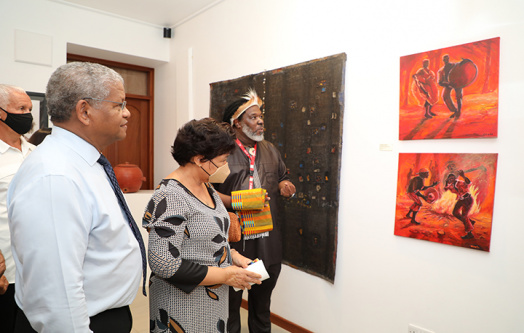
The President of the Republic, Mr. Wavel Ramkalawan was the guest of honour at the official launching of the FetAfrik 2022 edition that coincides with Africa Day celebrated annually on May 25, which marks the birth of the Organization of the African Unity the OAU, now known as the African Union (AU). The official ceremony took place at the National History Museum in Victoria yesterday afternoon.
Delivering his address to launch the year’s edition, the Secretary General for Seychelles National Institute of Culture Heritage and the Arts, Mr. David Andre said that Africa Day gives an opportunity to celebrate African diversity and success. He noted that it is a time to highlight the cultural and economic potential that exists in Africa, while its people strive to resolve ongoing challenges and achieve peace across the continent.
“We locally celebrate our version of Africa Day with our annual event entitled ’Fet Afrik’. Which will continue to feature on the annual calendar of the Culture Institute. Fet Afrik celebrates the diversity, contribution and the strength of our African heritage and cultural history, left to us by our forefathers that we need to preserve for future generations. At this point I would like to pay homage to our Moutya, our direct connection with our African ancestry and proudly inscribed on the UNESCO’s list of intangible heritage in December 2021,” said Mr. Andre.
He also touched upon this year’s theme, ‘Strengthening Resilience in Nutrition and Food Security on the African Continent: Strengthening Agro-Food Systems, Health and Social Protection Systems for the Acceleration of Human, Social and Economic Capital Development'. There, he outlined the challenges the African continent still endures due to the COVID-19 pandemic. Furthermore, Mr. Andre underlined the importance of applying traditional knowledge in the overall development of the country.
“The application of traditional knowledge in areas such as the ecosystem, water and landscape management, soil conservation, biological control of pests and diseases, ecological agriculture and livestock practices, plant and animal breeding, lead to food security and prevents or even alleviates poverty”
“Being a resilient and adaptable nation, we used to apply traditional knowledge in the early warning systems that calculated risks and detected extreme weather events, such as droughts and even floods. The knowledge was used in adapting subsistence strategies for agriculture, fishing, forestry and foraging, improving water and resource management, enhancing ecosystems, selection of resources to mitigate or adapt to the effects of climate change,” he said.
To conclude, Mr, Andre encouraged the members of the public to participate actively in the different activities and to learn more about the African heritage.
After the ceremony, President Ramkalawan and other distinguished guests had the honour to view an exhibition entitled “Out of Africa”, which is also featured on the year’s FetAfrik programme.
A series of activities for members of the public will start on May 26 to 28. This year, all activities will be hosted at the National Museum of History and in the Camion Hall garden. These will include the much-loved African Bazaar, a one-hour of moutya music by the Fek Arive group, fashion, music, and literature among many other cultural activities that the members of the public can follow through the FetAfrik programme for more details.